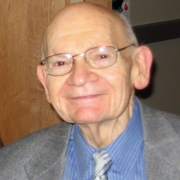
The Department of Philosophy is sad to report the death of Israel Scheffler, Victor S. Thomas Professor of Education and Philosophy, Emeritus. Professor Scheffler passed away on February 16, 2014. He was 90 years old.
Professor Catherine Z. Elgin, Professor of the Philosophy of Education in the Harvard Graduate School of Education, has written a tribute to Professor Scheffler, which you will find below.
Israel Scheffler
Israel Scheffler, Victor S. Thomas Professor of Education and Philosophy Emeritus died on February 16, 2014 at the age of 90. Over an extended career he made major contributions to the philosophy of science, the philosophy of education, and the theory of symbols. He was the author of 17 books including The Anatomy of Inquiry, Science and Subjectivity, Beyond the Letter, and The Language of Education.
He earned a B.A. and M.A. from Brooklyn College, an M.H.L. and D.H.L. (hon.) from the Jewish Theological Seminary of America, and a Ph.D. from the University of Pennsylvania, where he studied under Nelson Goodman. He taught at Harvard for 40 years, from 1952 to 1971. In his retirement, he founded and directed the Philosophy of Education Research Center at Harvard Graduate School of Education.
Scheffler was not only an important scholar and teacher, he was also a masterful mentor. Harvey Siegel, one of his advisees and now Professor of Philosophy at University of Miami, praised him for knowing when to guide a student and knowing when to back off. Miriam Solomon, Professor of Philosophy at Temple University, says he was the kindest philosophy professor she has ever met. According to Catherine Elgin, he was an acute but remarkably gentle critic. He could and did spot flaws in an argument. But his target was always the argument, never the arguer. He criticized in a way that made it manifest that he wanted to help his interlocutor to make the best possible case for her position. He did not want to score points or win arguments. He wanted to figure out what, given the reasons at hand, we should think about the topic under discussion. He treated everyone he encountered with respect.
